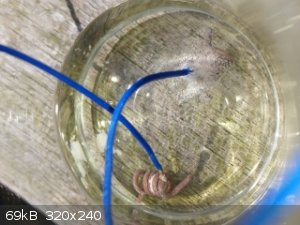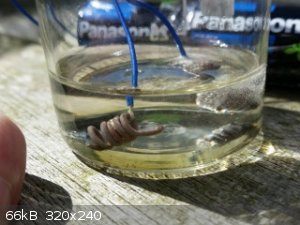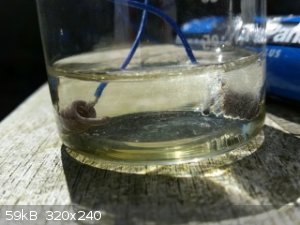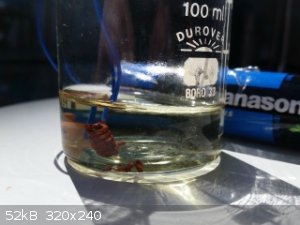MrMario
Harmless

Posts: 46
Registered: 2-2-2016
Member Is Offline
Mood: No Mood
|
|
How to test if H2SO4 or HBr
I have a bottle with an unknown acid which is H2SO4 or HBr. How can i check which one it is? I tried to put two copper electrodes in a small sample of
the solution and connected them to a battery. I saw some pink/purple color forming but don't know if it is because the acid attacks copper.
|
|
|
OneEyedPyro
Hazard to Others
  
Posts: 280
Registered: 7-10-2015
Member Is Offline
Mood: No Mood
|
|
One easy way to tell would be by heating a small sample, HBr would boil away rather quickly while a H₂SO₄ should take much longer to boil away
completely. Sulfuric acid typically has little to no smell either while even a fairly weak HBr solution should have a sharp scent similar to HCl.
|
|
|
MrHomeScientist
International Hazard
    
Posts: 1806
Registered: 24-10-2010
Location: Flerovium
Member Is Offline
Mood: No Mood
|
|
Do the standard test for sulfate by adding a soluble barium or calcium compound. If a white precipitate is seen, it's sulfuric acid.
|
|
|
MrMario
Harmless

Posts: 46
Registered: 2-2-2016
Member Is Offline
Mood: No Mood
|
|
Thanks for the fast help. I added some HCl to form Elemental Bromine again but not even the slightest color change occured, so i guess it's Sulphuric
acid.
|
|
|
ParadoxChem126
Hazard to Others
  
Posts: 104
Registered: 5-4-2013
Location: USA
Member Is Offline
Mood: No Mood
|
|
HCl will not react with hydrobromic acid to produce elemental bromine. Bromine should, however, be released in an oxidizing environment. It may
produce a color change in contact with aqueous hydrogen peroxide, but stronger oxidizing agents (e.g. potassium permanganate) would produce more
significant quantities of bromine. MrHomeScientist's sulfate test is probably the most practical (and safest) option here.
|
|
|
MrMario
Harmless

Posts: 46
Registered: 2-2-2016
Member Is Offline
Mood: No Mood
|
|
@Paradox
I saw it a guy doing it here as a test. https://www.youtube.com/watch?v=N3qGWFlTz58 (At 1.50)
[Edited on 14-4-2016 by MrMario]
|
|
|
Darkstar
Hazard to Others
  
Posts: 279
Registered: 23-11-2014
Member Is Offline
Mood: Sleepy
|
|
I think he meant he added HCl to the sample that he had the electrodes in, which would have created some hypobromite if it were HBr.
|
|
|
DraconicAcid
International Hazard
    
Posts: 4360
Registered: 1-2-2013
Location: The tiniest college campus ever....
Member Is Offline
Mood: Semi-victorious.
|
|
Add a drop to a solution of silver nitrate. Silver bromide will precipitate; silver sulphate will not.
Add some to some copper oxide. If it dissolves to give blue, it's sulphuric. If it dissolves to give purple or brown, it's hydrobromic.
Please remember: "Filtrate" is not a verb.
Write up your lab reports the way your instructor wants them, not the way your ex-instructor wants them.
|
|
|
Nucleophile
Harmless

Posts: 11
Registered: 14-4-2016
Location: My laboratory
Member Is Offline
Mood: No Mood
|
|
@MrMario
Just add the acid to some Calcium chloride. If it is H2SO4, CaSO4 is going to precipitate out. Calcium bromide is very soluble.
|
|
|
JJay
International Hazard
    
Posts: 3440
Registered: 15-10-2015
Member Is Offline
|
|
Quote: Originally posted by Nucleophile  | @MrMario
Just add the acid to some Calcium chloride. If it is H2SO4, CaSO4 is going to precipitate out. Calcium bromide is very soluble.
|
This.
|
|
|
aga
Forum Drunkard
    
Posts: 7030
Registered: 25-3-2014
Member Is Offline
|
|
Illuminate the bottle with a strong White light (e.g Sunlight).
Then place it on a revolving device if available, or simply use your hands to slowly and carefully revolve it about it's vertical axis.
Whichever way, rotate it through a full 360 degrees and record any observations at 5 degree intervals.
The bottle may have a Label saying what it is.
|
|
|
ParadoxChem126
Hazard to Others
  
Posts: 104
Registered: 5-4-2013
Location: USA
Member Is Offline
Mood: No Mood
|
|
Hmmm... Does anyone know what is happening here? It seems rather unlikely that HCl can oxidize the bromide back to bromine.
|
|
|
MrMario
Harmless

Posts: 46
Registered: 2-2-2016
Member Is Offline
Mood: No Mood
|
|
I put some CaCl2 solution with the unknown acid in a beaker and nothing visible happened.
Now i'm not 100% sure if it's HCl or HBr so I put two copper elektrodes again in the solution.
H2 gas was produced and the solution became yellowish + some slightly yellow powder at the electrode.
Since AgNO3 is not avaible and would in both situations (AgCl/AgBr) produce a percipitate i don't know how i could else test it.
Here are some pictures of the electrolysis of the solution:




|
|
|
ave369
Eastern European Lady of Mad Science
   
Posts: 596
Registered: 8-7-2015
Location: No Location
Member Is Offline
Mood: No Mood
|
|
By smell, godsdammit! H2SO4 has no smell. HBr has a smell.
Smells like ammonia....
|
|
|
DJF90
International Hazard
    
Posts: 2266
Registered: 15-12-2007
Location: At the bench
Member Is Offline
Mood: No Mood
|
|
I advise the OP to find a decent text on qualitative inorganic analysis.
|
|
|
MrMario
Harmless

Posts: 46
Registered: 2-2-2016
Member Is Offline
Mood: No Mood
|
|
Ye.. That might be a good idea. Do you know any good ones that i can find via the web?
|
|
|
DraconicAcid
International Hazard
    
Posts: 4360
Registered: 1-2-2013
Location: The tiniest college campus ever....
Member Is Offline
Mood: Semi-victorious.
|
|
Vogel's Qualitative Inorganic Analysis
https://www.google.ca/url?sa=t&rct=j&q=&esrc=s&a...
Please remember: "Filtrate" is not a verb.
Write up your lab reports the way your instructor wants them, not the way your ex-instructor wants them.
|
|
|
chemrox
International Hazard
    
Posts: 2961
Registered: 18-1-2007
Location: UTM
Member Is Offline
Mood: LaGrangian
|
|
where is that?
"When you let the dumbasses vote you end up with populism followed by autocracy and getting back is a bitch." Plato (sort of)
|
|
|
ParadoxChem126
Hazard to Others
  
Posts: 104
Registered: 5-4-2013
Location: USA
Member Is Offline
Mood: No Mood
|
|
|
|
|